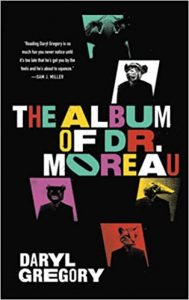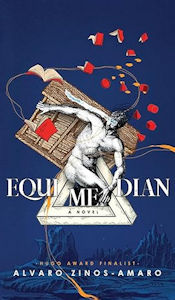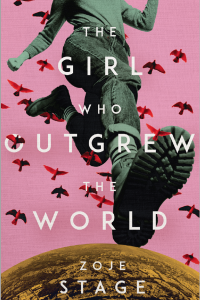Gary K. Wolfe and Adrienne Martini Review The Album of Dr. Moreau by Daryl Gregory
 The Album of Dr. Moreau, Daryl Gregory (Tordotcom 978-1250782106, $14.99, 176pp, tp) May 2021.
The Album of Dr. Moreau, Daryl Gregory (Tordotcom 978-1250782106, $14.99, 176pp, tp) May 2021.
Already in the public domain for years, H.G. Wells’s The Island of Dr. Moreau has practically spawned a microgenre all its own, with Brian Aldiss, Gwyneth Jones (as Ann Halam), Gene Wolfe, Theodora Goss, the Simpsons, and even Marlon Brando having a whack at the story or its characters and themes. I’m pretty sure, though, that Daryl Gregory is the first to come up with the notion that those human/beast hybrids would make a dandy boy band. It shouldn’t be that much of a surprise; Gregory has been fascinated with the plasticity of the body and altered humans throughout his career: the grotesquely transformed residents of a small town in The Devil’s Alphabet, a zombie somehow raised from infancy in Raising Stony Mayhall, the victims of mutilations, cannibals, and cults in We Are All Completely Fine. The idea of mashing up the closest thing Wells wrote to a pure horror story with KPop-style media stardom might sound fatally whimsical, except for two things: the compassion with which Gregory customarily treats his most damaged characters, and his decision to cast the whole tale as a locked-room murder mystery with all its formal conventions, even to the point of quoting T.S. Eliot’s “five rules of detective fiction” (which, for the most part, Gregory cheerfully ignores).
Calling themselves the WyldBoyZ, the band members are all genetic human-animal hybrids, victims of a heinous Moreau-like program on a mysterious barge, which we eventually learn about as their backstory unfolds. Rescued by an Ecuadoran fishing boat after they escape, they become an international tabloid sensation, and then a musical sensation once they come under the management of a sleazy promoter who calls himself Dr. M – who has been ripping them off royally, mostly by taking advantage of their legal status (technically, they entered the country as livestock). As they gain fame, they inevitably adopt the de rigueur roles of boy band members – the romantic one (part bonobo), the shy one (part pangolin), the funny one (a giant bat), the smart one (part elephant), and the cute one (part ocelot). The mystery opens when Bobby O – the cute one – wakes up in his hotel room covered in blood, the butchered corpse of their manager in bed next to him. He has no memory of what happened after a wild party the night before, but he’s not the only suspect: another band member has been sleeping with the manager’s opportunistic wife. The detective assigned to the case, Lucia Delgado, also happens to be the mother of a nine-year-old WyldBoyZ superfan, setting up some tension as well as some rather sweet sitcom moments for later in the story.
As usual, Gregory writes with empathy and insight about the plight of damaged outsiders, as the unique problems and resentments of each of the band members emerge during the investigation. His neatest trick is keeping the grim backstory balanced with the sort of wacky good humor that teen superstars are expected to display, and with the formal demands of the locked-room procedural. The whole thing is structured as an album, with 14 tracks, an introduction, and a “bonus track,” and framed as a letter sent years later to the detective’s grown daughter, now a superstar herself. As with much of Gregory’s fiction, there’s a sentimental edge to the grotesquerie, and a grotesque edge to the comedy (which sometimes edges into James Morrow territory), but it all somehow works, thanks to Gregory’s essentially optimistic humanism and his apparent total lack of concern about recriminations from Wells’s vengeful ghost.
-Gary K. Wolfe
Daryl Gregory’s novella The Album of Dr. Moreau is a wink to the H.G. Wells novel but wholly its own detective story about a murder, an intrepid investigator, and genetic engineering. It’s about a million times more entertaining than both the Wells novel and the Val Kilmer-vehicle that was made from it.
It’s 2001 in Gregory’s Las Vegas. Last night, the WyldBoyZ, a boy band, played their last show. This morning, the band’s Svengali-esque Dr. M is discovered dead, shredded to death by someone or something with big claws. Band member Bobby woke up in the same bed as the dead doctor and, given that he’s part ocelot, happens to have very big claws. Detective Luce Delgado, who has her own very Vegas backstory, is called in to figure out whodunnit. The result is a straight-up detective tale with science fictional tropes about gene splicing underpinning the whole world. There are puns a’plenty and colorful characters to keep the tone brisk and engaging. Underneath, however, there are questions about what makes a human human, and that makes Gregory’s sleight-of-hand more meaningful than it first appears.
-Adrienne Martini
Gary K. Wolfe is Emeritus Professor of Humanities at Roosevelt University and a reviewer for Locus magazine since 1991. His reviews have been collected in Soundings (BSFA Award 2006; Hugo nominee), Bearings (Hugo nominee 2011), and Sightings (2011), and his Evaporating Genres: Essays on Fantastic Literature (Wesleyan) received the Locus Award in 2012. Earlier books include The Known and the Unknown: The Iconography of Science Fiction (Eaton Award, 1981), Harlan Ellison: The Edge of Forever (with Ellen Weil, 2002), and David Lindsay (1982). For the Library of America, he edited American Science Fiction: Nine Classic Novels of the 1950s in 2012, with a similar set for the 1960s forthcoming. He has received the Pilgrim Award from the Science Fiction Research Association, the Distinguished Scholarship Award from the International Association for the Fantastic in the Arts, and a Special World Fantasy Award for criticism. His 24-lecture series How Great Science Fiction Works appeared from The Great Courses in 2016. He has received six Hugo nominations, two for his reviews collections and four for The Coode Street Podcast, which he has co-hosted with Jonathan Strahan for more than 300 episodes. He lives in Chicago.
Adrienne Martini has been reading or writing about science fiction for decades and has had two non-fiction, non-genre books published by Simon and Schuster. She lives in Upstate New York with one husband, two kids, and one corgi. She also runs a lot.
This review and more like it in the June 2021 issue of Locus.
 While you are here, please take a moment to support Locus with a one-time or recurring donation. We rely on reader donations to keep the magazine and site going, and would like to keep the site paywall free, but WE NEED YOUR FINANCIAL SUPPORT to continue quality coverage of the science fiction and fantasy field.
While you are here, please take a moment to support Locus with a one-time or recurring donation. We rely on reader donations to keep the magazine and site going, and would like to keep the site paywall free, but WE NEED YOUR FINANCIAL SUPPORT to continue quality coverage of the science fiction and fantasy field.
©Locus Magazine. Copyrighted material may not be republished without permission of LSFF.







